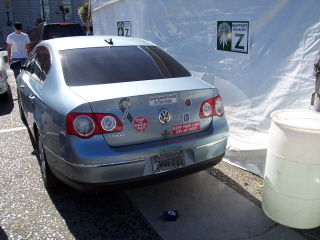Announcement: DRCNet Content Syndication Feeds Now Available for YOUR Web Site!
Support the cause by featuring automatically-updating Drug War Chronicle and other DRCNet content links on your web site!
Why would black drivers be arrested more often? Maybe because African-Americans commit crimes at a far higher rate and are convicted of felonies at a far higher rate. In 2005, for instance, blacks were nearly seven times more likely to be in prison than whites.This is textbook circular reasoning of the sort that will earn you an F in Philosophy 101. By Chapman's logic, police could stop investigating white people entirely and we'd soon see that minorities commit 100% of all crimes.
Likelihood of search finding criminal evidenceThis data comes straight from a report referenced by Chapman, yet he insists that "a motorist of felonious habits is also more likely to have illegal guns or drugs on board," and "the average black driver is statistically more likely to be a criminal than the average white driver."
Searches of black drivers or their vehicles were less likely to find criminal evidence (3.3%) than searches of white drivers (14.5%), and somewhat less likely than searches of Hispanic drivers (13%).
 DRCNet bumper sticker on a car at the SF marijuana march
I'll be writing this week about the Global Marijuana Marches that were set to take place in 232 cities Saturday. I drove into San Francisco for the event there, and I've gathered some initial reports from around the globe. Look for a full run-down in the Chronicle on Friday.
Saturday was glorious in San Francisco, with sunny skies and temperatures in the 70s. San Francisco's version of the global marijuana march, Cannabis Awareness Day, was at City Hall plaza, where rows of vendors and exhibitors bracketed the crowd and local bands blasted rock, surf, pop, and rhythm & blues at the crowd.
The San Francisco event was long on music, short on rhetoricâ"We've heard all that pot talk before," said one organizer from the stageâand extremely mellow. What pot politics there was came around making too much money off the dispensaries, with some speakers warning that the greedy would be weeded out. Jack Herer held court in one tent as star-struck fans sought autographs and pictures. There was lots of open pot-smoking, and not a policeman in sight all afternoon. It was like a lovely afternoon in the community park.
Things weren't so mellow in Eastern Europe. In Sofia, Bulgaria, police dispersed a crowd of about 400 demonstrators, blocking the event from taking place. It was worse in Moscow, Russian police attacked ralliers, arrested 30 and beating others. Some have already been sentenced to jail time. In Prague, by contrast, authorities stood aside as about 1500 held a pot party at Letna Plain.
The largest rally reported so far was in Toronto, where "Prince of Pot" Marc Emery led a crowd of about 20,000 in calling for freeing the weed. I haven't heard anything from other European capitals or the big cities of Latin America yet.
Meanwhile, down under at the Nimbin Mardi Grass festival in Austalia, police reported more than 100 arrests, 60 of them for marijuana, among the more than 7,000 festival-goers.
What does all this mean? What does it accomplish? Look for some rumination on these questions as well as more scene reports on Friday.
(Click the "read full post" link or here for more pictures.)
DRCNet bumper sticker on a car at the SF marijuana march
I'll be writing this week about the Global Marijuana Marches that were set to take place in 232 cities Saturday. I drove into San Francisco for the event there, and I've gathered some initial reports from around the globe. Look for a full run-down in the Chronicle on Friday.
Saturday was glorious in San Francisco, with sunny skies and temperatures in the 70s. San Francisco's version of the global marijuana march, Cannabis Awareness Day, was at City Hall plaza, where rows of vendors and exhibitors bracketed the crowd and local bands blasted rock, surf, pop, and rhythm & blues at the crowd.
The San Francisco event was long on music, short on rhetoricâ"We've heard all that pot talk before," said one organizer from the stageâand extremely mellow. What pot politics there was came around making too much money off the dispensaries, with some speakers warning that the greedy would be weeded out. Jack Herer held court in one tent as star-struck fans sought autographs and pictures. There was lots of open pot-smoking, and not a policeman in sight all afternoon. It was like a lovely afternoon in the community park.
Things weren't so mellow in Eastern Europe. In Sofia, Bulgaria, police dispersed a crowd of about 400 demonstrators, blocking the event from taking place. It was worse in Moscow, Russian police attacked ralliers, arrested 30 and beating others. Some have already been sentenced to jail time. In Prague, by contrast, authorities stood aside as about 1500 held a pot party at Letna Plain.
The largest rally reported so far was in Toronto, where "Prince of Pot" Marc Emery led a crowd of about 20,000 in calling for freeing the weed. I haven't heard anything from other European capitals or the big cities of Latin America yet.
Meanwhile, down under at the Nimbin Mardi Grass festival in Austalia, police reported more than 100 arrests, 60 of them for marijuana, among the more than 7,000 festival-goers.
What does all this mean? What does it accomplish? Look for some rumination on these questions as well as more scene reports on Friday.
(Click the "read full post" link or here for more pictures.)